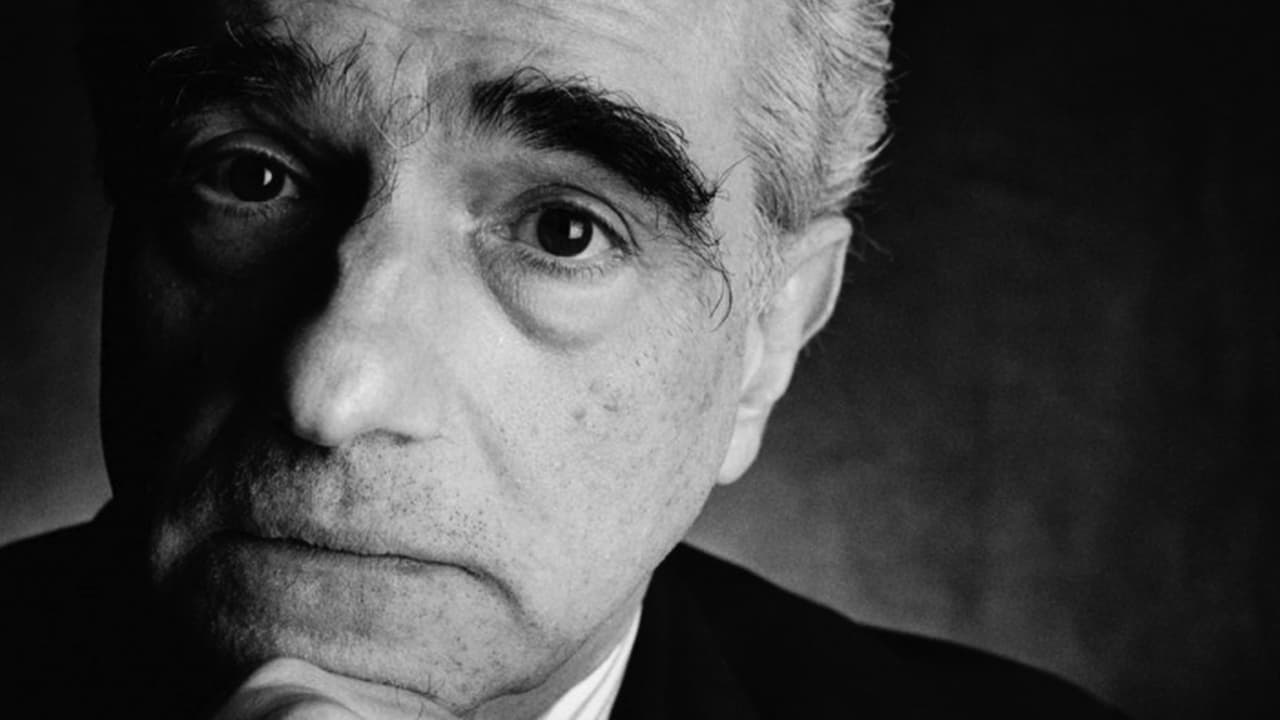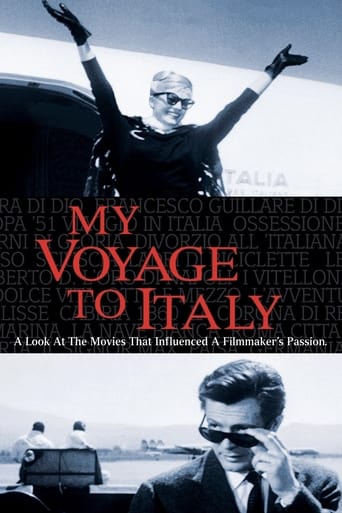

Nice effects though.
... View MoreLoad of rubbish!!
... View MoreExcellent, a Must See
... View MoreOne of the film's great tricks is that, for a time, you think it will go down a rabbit hole of unrealistic glorification.
... View More"My Voyage to Italy" is a great film if you are trying to look into the mind of Martin Scorsese or if you are a film student. He talks very candidly about himself and about his adoration of Italian movies and is wonderful for his dedication to film preservation and appreciation. However, if you want to learn about some great Italian films so you can watch them yourself, "y Voyage to Italy" also has a few problems. It isn't a complete overview of great Italian films but a look at Italian films that Scorsese loves and the films ONLY covers a couple decades of cinema. Therefore, it is not exhaustive and many wonderful films from this same period (about 1943 to the mid-1960s) are omitted. And, most importantly, Scorsese not only talks about the films but divulges ALL the endings and twists and meaning--possibly ruining the viewing experience for anyone looking to follow his recommendations for great films to watch. Now all this does not seem like enough that you should completely avoid his film--there are some interesting insights into the films and Scorsese's mind. Just be aware of all this before you decide to watch--it could spoil your chance to experience the films without preconceptions and too much information.As for me, I mildly enjoyed it but was saddened that some of Vittorio De Sica's best films were not even mentioned (probably because he is my personal favorite of these directors). While "The Bicycle Thief" is perhaps his most famous film he directed and I did love Scorsese's discussion of "Umberto D.", the much lesser known and earlier "The Children Are Watching Us" is, in my mind, his very best--and it's an incredibly brave film that predated the ones discussed in "My Voyage to Italy". Now I cannot blame Scorsese for not mentioning it--the film has only recently been re-released by Criterion. An additional film, though, that he should have seen but didn't mention was "Miracle in Milan"--a film that combines wonderful Neo-Realism with the Surrealism that Fellini was known for--but MUCH earlier in the history of Italian cinema. It is brilliantly quirky. Likewise, I would have loved a discussion of Fellini's films between "I Vitelloni" and "La Dulce Vida"--as films like "La Strada" and "Nights of Cabiria" seem oddly absent from Scorsese's discussion.Perhaps I am too picky--especially since I have seen most of the films he discusses. And, perhaps I am too critical because of my adoration of foreign cinema. Plus, I realize I do have very, very strong opinions! All I know is that I did enjoy the film but really would have preferred a most exhaustive and comprehensive overview--but it would have probably lasted 10-12 hours or more! When they bring out some film like this, please let me know!
... View MoreIntense and prolific filmmaker Martin Scorsese did not seem to be satisfied with projecting the influence he drew from Italian films from the 1940s, '50s, and '60s on his own films. So, he spends four solid hours explaining the details and expressions of at least thirty films, all condensed into about ten minutes each. He analyzes and discloses trivia about each of them and pours out all of his passion into this like water bore over his shoulders that he can't bear anymore.For awhile, I was wondering why he would spend so much time doing this. Why make a movie wherein most of the footage is taken from other movies? Why examine a condensed version of each film from beginning to end when we may want to see these movies ourselves? Well, after awhile, I realized the point of this. Scorsese had a very important reason why he wanted to make this epic documentary. It's because these films are what made him the filmmaker he is, not to mention the person he is, and their effects have not weakened throughout time. So, he wants to perpetuate their lives. He wants to interest younger generations, such as mine, in these films and their makers.And I'll tell you what. It works. I am now very interested in seeing a lot of these movies. I realize I have not seen nearly enough films by Roberto Rossellini, Luchino Visconti, or Vittorio De Sica. And I plan to, thanks to Scorsese's film.
... View MoreMY VOYAGE TO ITALY (directed by Martin Scorsese) What is it that's so relaxing about Martin Scorsese's voice? I don't know. I've talked to a few different people and we all find his voice to be so comforting. Plus he's smart. I loved his contribution to BFI's 100 Years of Cinema (released in the states as "A Personal Journey") and I really love the documentary "Martin Scorsese Directs" from the American Masters series. I've watched them both over and over.So now I can add another documentary to that list with "My Voyage To Italy". Studying the most important age in film worldwide, Neo Realism, he examines the main players and their major films in a way that is engaging without condescension or over-statistical, boredom. The guy really loves movies and he knows what's important.His film history is just one of many alternative histories to the one championed by film critics static in their culture and prejudices. In writing about Rossellini, De Sica, Fellini and my hero Antonioni he writes about what he loves and what he sees as important. He even picks films that were seen as disasters financially and critically pointing out how their importance was more profound than such predictable criteria. For example, Rossellini's "Voyage To Italy" was a critical and financial failure but what championed by the Cahiers Du Cinema writers like Godard and Truffaut.Scorcese's narration is smart and so loving that from anyone else you would think it pitiful. But in this situation, it's inspiring and just great storytelling.
... View MoreThis is less a documentary than a visual diary of one man's selective view of Italian Cinema of the 50's & 60's. Of course, when that man is Martin Scorsese, it demands the attention of cineastes worldwide. In the introduction, one could assume that Scorsese will give a general view of the Italian films he saw as a child and as a young adult. But soon, he plunges into a hour plus mini-documentary of Roberto Rossellini. This is certainly understandable not only because Rossellini was a seminal Italian filmmaker, but because Scorsese in fact married into the family (via his ex Isabella). From there it's on to Visconti, De Sica, Fellini and Antonioni. And, that's about all. A few other filmmakers are touched upon briefly, but those five comprise the heart of the nearly 4 hour long film. Of course, rarely has a country given the world cinema a quintet as gifted as these five men. Still, it would have been illustrative if Scorsese had donated perhaps half and hour of the picture to a survey of the other Italian filmmakers of the era. These are mere quibbles, however. For no world class filmmaker (with the possible exception of Truffuat) has ever poured out so much emotion and depth of understanding for other directors as Scorsese has here. The portrayal of Rossellini in particular will be hard-pressed to ever be equaled - let alone surpassed. A demanding, yet essential film history.
... View More